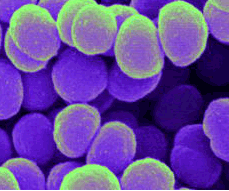Bacteria: certain types are to blame
When meningitis is caused by bacteria, it’s called bacterial meningitis.
And 3 different types of bacteria are mostly responsible in healthy
people, although other kinds of bacteria can also cause meningitis:
- Neisseria meningitidis
- Streptococcus pneumoniae
- Haemophilus influenzae type b
The specific type makes a difference
Today, bacterial meningitis caused by Streptococcus pneumoniae and Haemophilus influenzae type b has been greatly reduced by vaccination. Vaccines are also available to protect against Neisseria meningitidis, but the current vaccines have certain limitations. These include not being suitable for children under 2 years of age and not protecting against all important strains of this bacteria.
How bacteria are spread—transmission and disease
The bacteria that may lead to meningitis can be spread through the exchange of droplets of saliva or nasal mucus. Everyday objects that you touch can also have bacteria on them, if they come in contact with droplets of saliva or mucus. That’s why it makes sense to wash your hands often and to avoid sharing eating and drinking utensils like glasses and water bottles. However, your best recommended protection can be through vaccination.
Bacterial meningitis—causing disease around the world
When it comes to cases of bacterial meningitis, the numbers are eye-opening:
- Each year, there are over 1 million cases of bacterial meningitis worldwide
- Bacterial meningitis accounts for about 200,000 deaths each year worldwide
— When bacterial meningitis occurs in epidemics, Neisseria meningitidis is often the cause
— Most epidemic cases of meningococcal disease occur in a region of Africa known as the “meningitis belt”
